- Home
- Deborah Harkness
Time's Convert Page 42
Time's Convert Read online
Page 42
We made use of the chaise and lingered to watch the clouds through the skylight. The puffs of white came into view against the bright blue background, changed their shapes, and moved on in a never-ending parade.
We stayed at the boathouse for as long as we thought we could get away with before someone would come to look for us. When we could postpone it no longer, Matthew helped me to my feet and we returned to the house, hand in hand, relaxed and happy.
But I felt the tension the moment we stepped into the kitchen.
“What’s wrong?” I said, looking around the kitchen for signs of fire, flood, or other natural disasters.
“You’ve got a visitor,” Sarah said, munching her way through a bowl of popcorn. “Marcus told him to go away—well, he told him to bugger off, but that’s the same thing.”
A bloodcurdling shriek came from upstairs.
“Apollo really doesn’t like your brother, Matthew,” Sarah said. “He’s flying around in the stairwell, carrying on as if it’s the end of the world.”
Matthew gave a sniff and turned to me with an accusing stare. “You said you hadn’t heard from Baldwin.”
“No, I said I hadn’t talked to him,” I said, feeling that it was important to draw the distinction. “Not the same thing at all.”
“Where are the children?” Matthew demanded.
“Jack and Marthe are with them. Marcus and Agatha are with Fernando in the great hall, trying to talk Baldwin down off the mountain,” Sarah said around another mouthful of popcorn. “I volunteered for lookout duty. Baldwin makes me nervous.”
Matthew stalked off in the direction of the hall.
“Should you call Ysabeau?” Sarah asked.
“Already on her way,” I said. “We invited her to come for the fireworks.”
“Guess we won’t have to wait until dark for the excitement to start after all.” Sarah dusted the salt off her hands and hopped off the stool. “Let’s go. We don’t want to miss anything.”
When we arrived in the hall, Matthew and Baldwin were facing off across the carpet while Marcus and Fernando urged them both to see sense. Agatha’s contributions to the negotiations involved pointing out that this whole family drama smacked of male privilege.
“You need to take a deep breath and realize that this isn’t all about you,” Agatha said. “You’re behaving like these children are chattel.”
“God, I love that woman,” Sarah said, beaming. “Down with patriarchy. Right on, Agatha.”
I had had it, too. I turned my hands heavenward and splayed my fingers wide. Brightly colored strands appeared, snaking down each finger, across my palms, and around my wrists.
“With knot of one, the spell’s begun,” I said.
“This is what happens when you don’t answer your e-mail!” Baldwin said, shaking his finger at me.
“With knot of two, the spell be true.” I touched the tips of my thumb and little finger together. A silver star emerged from where the two met.
“Don’t speak to Diana like that, Baldwin,” Matthew warned.
“With knot of three, the spell is free,” I said, releasing the star into the sky.
“Cool,” Sarah said, watching my every move.
“With knot of four, the power is stored.” My ring finger glowed with an inner, golden light, and the silver star grew in size, floating toward the knot of men in the hall.
“Does anyone smell something burning?” Marcus wrinkled his nose.
“With knot of five, the spell will thrive.” I touched the green thumb on my right hand to my middle finger, uniting the energy of the goddess as mother with the spirit of justice.
“Well, well,” Fernando said, looking at the five-pointed silver star that was hovering above him. “I don’t believe anyone’s ever put a spell on me.”
“With knot of six, this spell I fix.”
The star descended in a whoosh, tangling Matthew, a startled Baldwin and Marcus, and a bemused Fernando in its loops and twirls. With a flick of my fingers, I tightened the star so that it held them fast. Then I gave it an extra twist so that the more they struggled against the bonds, the more snug they would become.
“You lassoed us!” Marcus exclaimed.
“Diana went to camp in Montana one summer,” Sarah said. “She wanted to be a cowgirl. I had no idea they taught her how to do that.”
“You wanted to talk to me, Baldwin?” I said, advancing slowly on the group. “I’m all ears.”
“Let me go,” Baldwin said through clenched teeth.
“Not fun, is it, to be all tied up?” I asked.
“You’ve made your point,” my brother-in-law said.
“Oh, come on,” I said. “Since when has it been that easy to change your mind? As you see, Baldwin, I’m not against tying people up when they deserve it. But this branch of the family is done with turning their children into puppets and wrapping them in knots.”
“If Rebecca has blood rage—”
“If Becca has blood rage. If Philip is a weaver. If, if, if,” I interrupted. “We’ll just have to wait and see.”
“I told you to run tests,” Baldwin said, trying to grab Matthew. The movement forced the bindings tighter, just as I intended.
Ysabeau arrived with a wicker hamper filled with bottles. She surveyed the scene and smiled.
“How I’ve missed family gatherings,” she said. “What have you done this time, Baldwin?”
“All I’m trying to do is keep this family from self-destructing,” Baldwin shouted. “Why is it so impossible for the rest of you to see the trouble Rebecca might cause? The child cannot go around biting people. If she has blood rage, she could give it to others.”
Jack entered the room with Becca in his arms. Her eyes were red-rimmed, and her arms were wrapped tightly around Jack’s neck. She had been crying.
“Stop it. All of you, just stop it,” Jack said fiercely. “You’re upsetting Becca.”
Jack’s voice was rough with emotion, but miraculously there was no sign of blood rage in his eyes. The children were often stabilizing influences on Jack, as though being responsible for their well-being trumped any other emotions or concerns he might have.
“Becca is a baby,” Jack said. “She couldn’t hurt anybody. She’s soft, and sweet, and trusting. How could you think Becca needs to be punished for being who she is?”
“Well said, Jack.” Agatha was beaming with pride.
“Dad keeps telling me what happened to me as a child wasn’t my fault. That the man who was supposed to take care of me didn’t hurt me because I was bad, or evil, or a whore’s son, or any of the things that he told me,” Jack continued.
Becca looked up at Jack as though she understood every word he said. She reached out with one of her small, fragile fingers and touched him lightly on the lips.
Jack took the time to give her a reassuring smile before resuming.
“Mum and Dad trust me,” Jack said. “Which means for the first time in my life, I feel like I can trust myself. That’s what families are supposed to do—not order each other around and make promises nobody should have to keep.”
I was so moved by Jack’s speech that I forgot to hold on to my binding spell. It fell to the floor, making a bright and gleaming star around the feet of the de Clermont men.
The youngest male in the family, on whose small shoulders so many hopes and expectations already rested, toddled down the stairs, holding on to Marthe with one hand and Apollo’s tail with the other. The three of them made a small but united pack.
“Nunkle!” Philip said, delighted to see Baldwin.
“We have a celebration planned for Independence Day,” I said. “Are you staying for the fireworks, Baldwin?”
Baldwin hesitated.
“You and I could take a ride while we wait for the fun to start,” Matthew said to his ste
pbrother. “It would be like old times.”
Becca squirmed to be put down. Once Jack placed her feet on the floor, she ran straight to Baldwin, her steps sure and her face determined as she trod on the fading remains of my spell.
“Horsey?” she said, looking up at her uncle with a winsome smile.
Baldwin took her hand in his. “Of course, cara. Whatever you wish.”
* * *
—
BALDWIN WAS DEFEATED, and knew it. But the look he gave me promised that our struggles over the children weren’t over yet.
At 10:37 P.M.—for it turned out that our fireworks display, like all others, was not ready precisely on time—the show began.
Marcus and I had devised a perfect division of labor. I provided the fire. He provided the work.
As the family climbed into the waiting boats so that they could drift on the moat and watch the display from every angle, Marcus dashed around the field making sure all of the man-made fireworks were ready. He plugged the string of lights into an extended line of cords that led back to the house. Once they were lit, the trees sparkled as though a hundred fireflies had settled onto the branches. Then he turned on the music. It was a rousing combination of Handel and military tunes from the American Revolution as well as the French.
“Ready?” Marcus asked, coming up behind me.
“As I’ll ever be,” I said.
I stood on a stack of hay bales and took the stance of an archer, tall and straight. I extended my left arm forward and drew my right arm back. A shimmering bow appeared, along with a silver-tipped arrow.
From the moat, only those with vampire sight would be able to detect my outline in the darkness. The rest would see only a bow and arrow, illuminated against the night sky.
I released my fingers and the arrow shot forth, traveling in a blazing arc toward the first of Marcus’s fireworks: a set of spinning Catherine wheels mounted on long poles in the ground. The arrow went straight through them, lighting each one in turn. They began to spin and spit fire, their colors bright and cheerful.
Oohs and aahs of delight as well as the enthusiastic clapping of the twins provided the backdrop while Marcus sped among his Roman candles. Each one shot into the air and burst into a thousand stars with a mild pop that didn’t seem to bother Apollo or the children. I’d put a silencing spell on them to keep the noise down and the animals calm.
At last it was time for the finale. Marcus and I had decided to use my power over fire and water to create something that would amaze not only the children, but the adults as well. I nocked another bolt of fire and pointed it straight above me into the sky.
The ball of flame climbed higher and higher. As it flew, a fiery green tail appeared. The tail stretched and grew, and the ball began to take the form of a firedrake.
I set up another arrow made from witchfire and launched it into the air. This one was golden and burnished, morphing and twisting into a young griffin who chased the firedrake across the heavens.
My magic almost depleted, I took my final fiery arrow and sent it into the moat. The surface hissed and popped as the magical flames traveled through the water, past the two boats of astonished spectators. Fish, seabeasts, and mermen and mermaids leaped into the air like sculpted soap bubbles, shimmering and dancing before they popped and disappeared like dreams.
The firedrake and griffin faded and then disappeared. The Catherine wheels spun to a stop.
Matthew broke the silence that followed with an unscripted addition to our fireworks display.
“We are such stuff / As dreams are made on,” Matthew said softly, “and our little life / Is rounded with a sleep.”
* * *
—
ONCE THE CHILDREN WERE PUT to bed, the adults gathered in the kitchen.
“I don’t remember spending this much time in the kitchen before,” Baldwin said, looking around as though the space were unfamiliar to him. “I must say, it’s a pleasant room.”
Sarah and I exchanged smiles. The domestication of Baldwin had begun.
“You should sleep in tomorrow, mon coeur,” Matthew said, rubbing the small of my back. “You expended a lot of energy tonight.”
“It was worth it.” I raised my glass of champagne. Ysabeau was right. Hers was much better than what we normally drank. “To life, liberty, and the pursuit of happiness.”
The family joined in the toast, and I saw even Fernando touch his wineglass to Baldwin’s, a definite hint that the de Clermont family might one day form a more perfect union.
“I wonder what they’re doing in Hadley to celebrate,” Marcus said. “It’s funny. I go for decades without ever thinking of home, and then something happens to bring it all back. Tonight, it was the smell of the hay bales and the flickering light from the fireworks.”
“When was the last time you saw Hadley?” Sarah asked.
“When I left America in 1781. I almost returned—once. But I went to New Orleans instead,” Marcus replied. “Ever since I met Phoebe, though, I think of going back. I imagine taking her there, after she finds out about Obadiah. If she still wants me after that.”
“She’ll still want you.” Of this, I was certain.
“As for Hadley, you can go back anytime you want,” Matthew said. “The house is yours.”
“What?” Marcus seemed confused.
“Obviously you haven’t waded through all of the Knights of Lazarus’s real estate transactions,” Matthew said drily. “I bought it from your mother, just before she and the rest of the family moved to Pennsylvania. Patience’s husband received a war pension, and they took it in the form of a land grant.”
“I don’t understand,” Marcus said numbly. “How could you have known then that I would ever want to return?”
“Because it’s your home, the land where you were born,” Matthew said. “Terrible things happened to you there, and you suffered as no child should have to suffer.”
I thought of Matthew, who, like Marcus, had chosen to end Philippe’s life rather than let his father live a broken man. These were not empty words to him. He spoke from the heart—and from experience.
“Time has a way of healing these old wounds,” Matthew continued. “Then a day comes when they no longer pain us as they once did. I hoped that would be the case with you. I saw how much you loved Hadley even when the memories of your father were still fresh and sharp, in 1781.”
“So you bought the farm,” Marcus said carefully. “And kept it.”
“And took care of it,” Matthew said. “The land has been worked ever since. I leased it to the Pruitts for as long as I could.”
“Zeb’s family?”
Matthew nodded.
Marcus buried his face in his hands, overcome with emotion.
“The hidden hand need not always be a crushing grip,” Ysabeau said gently, looking at Matthew with love. “The touch we feel as a restraint when we are younger has a way of bringing us comfort later in our lives.”
“We all chafed under Philippe’s rules, Marcus,” Baldwin said. “It just never occurred to us that it should—or even could—be any other way.”
Marcus thought about his uncle’s words for a moment.
“I blamed Matthew for what happened, at first. He seemed like the latest in a long line of patriarchs trying to take my freedom away,” Marcus said. “It took me a long time to see that he was caught in the same trap of loyalty and obedience that snared me in Hadley. And it took me even longer to admit that Matthew was right to come to New Orleans and put a stop to what I was doing.”
I could see from his expression that this was news to Matthew.
“I was too young to have children of my own. I should have learned my lesson from Vanderslice. But I kept making more. If you hadn’t come to New Orleans when you did, Matthew, there’s no telling what might have happened. But it would have been even bl
oodier—that I know for sure.”
Marcus leaned on the kitchen island, his fingers tracing the rough scars and gouges in the wood.
“Whenever I think of that time in my life, what I remember are the funerals. My journey to New Orleans began with one, and I left the city after a hundred more had taken place,” he said quietly. “Other people think of bright colors and laughter and parades when they think of New Orleans. But it has a darker side now—and it did then, too.”
32
Future
JANUARY 1805–SEPTEMBER 1817
Marcus was returning home in the small hours of a frigid January morning when he came upon a wizened old man fending off a mob of boys at the normally quiet intersection of Herring and Christopher Streets. The wooden houses and shops were shuttered, and there were no passersby to intervene. The man’s long coat was covered in muck, as though he’d been knocked down and hauled back onto his feet only to be knocked down again.
“Gettaway,” the man said, waving a pottery jug at the boys. His slurred speech indicated that he had been drinking. Heavily.
“Come on, grandpa. Where’s your patriotism?” one of the boys jeered. “We’re all entitled to some happiness, aren’t we?”
The rabble joined in with catcalls, and the circle around the man tightened.
Marcus shoved the young men aside, elbows pushing to the left and right in rapid succession. The crowd parted. The old man was cowering against a brick wall, his stance unsteady and his eyes unfocused. The acrid smell of fear and piss surrounded him. He flung both hands in the air, a gesture of surrender.
“Don’t hurt me,” the man said.
“Mr. Paine?” Marcus stared at the man. Under the smudges of dirt and beneath the frowsy, disorderly gray hair was a familiar face.
Paine squinted at Marcus, trying to ascertain whether he was friend or foe.

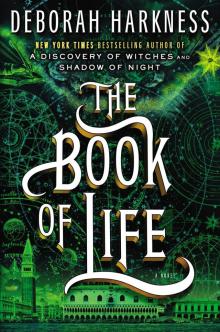 The Book of Life
The Book of Life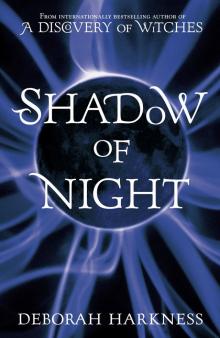 Shadow of Night
Shadow of Night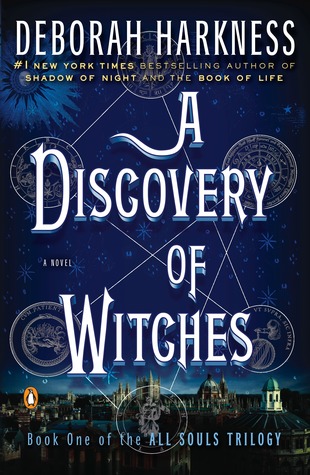 A Discovery of Witches
A Discovery of Witches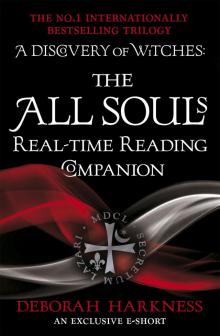 The All Souls Real-Time Reading Companion
The All Souls Real-Time Reading Companion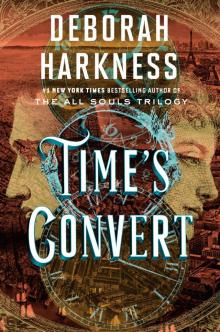 Time's Convert
Time's Convert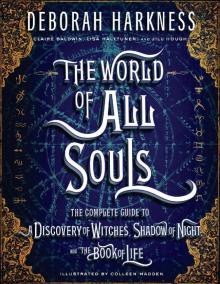 The World of All Souls
The World of All Souls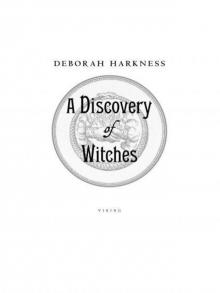 A Discovery of Witches: A Novel (All Souls Trilogy)
A Discovery of Witches: A Novel (All Souls Trilogy)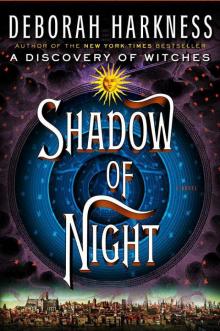 Shadow of Night: A Novel
Shadow of Night: A Novel